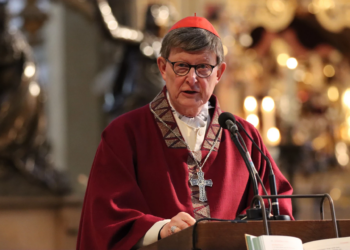Washington, D.C. Newsroom, Jun 5, 2025 /
18:13 pm
President Donald Trump’s order this week to restrict foreign nationals in 19 countries from entering into the United States will impact six countries with a majority Catholic population and four other countries with a heavy presence of Catholics or other Christians.
According to the order, some of the countries are facing restrictions based on national security concerns and a high terrorism risk. Others were chosen due to high rates of people from those countries overstaying their visas for entry into the United States and remaining in the country unlawfully.
The order includes a near-total ban on three countries with a majority Catholic population: the Republic of the Congo, Equatorial Guinea, and Haiti. There are also partial restrictions on three others with Catholic majorities: Burundi, Venezuela, and Cuba.
The near-total ban will also affect Eritrea, where about half of the population is Christian. The largest denomination in Eritrea is the Eritrean Orthodox Tewahedo Church. The partial restrictions will affect Togo, as well, where about half of the population is Christian and the largest Christian segment is Catholic.
Chad, a Muslim-majority country with a large Christian minority, is also facing a near-total ban on entry. More than 40% of the population is Christian, half of whom are Catholic. The majority Muslim country Sierra Leone will be subject to partial restrictions. More than 20% of the people who live there are Christian, most of whom are Protestant.
Six other Muslim-majority countries with very small Christian populations are also subject to the near-total ban: Afghanistan, Iran, Libya, Somalia, Sudan, and Yemen. Burma, where most of the population is Buddhist, is also facing a near-total ban. Turkmenistan, a majority Muslim country, is facing partial restrictions, as is Laos, which is mostly Buddhist.
In a statement to CNA on Thursday, Bishop Mark Seitz, chairman of the Committee on Migration at the United States Conference of Catholic Bishops (USCCB), criticized the new restrictions.
“Our country’s proud tradition as a land of opportunity for people from all walks of life is increasingly contradicted by a system that makes legal immigration impossible for far too many,” said Seitz, who has frequently criticized Trump’s immigration policies.
“A broad ban on nationals from these countries further erodes trust in our legal immigration system and marginalizes entire peoples,” the bishop said. “I pray that these restrictions will be lifted in due course.”
The travel restrictions imposed by Trump include several exceptions. Those exempted include people who are lawful permanent residents of the United States, those who obtain immediate family immigrant visas, and adoptions, among others. Special exemptions are also granted to those suffering religious persecution in Iran and those who have worked directly alongside American forces in Afghanistan.
“[I] hope that the stated exceptions in the proclamation, such as those for Afghans who supported our country, immediate family members, and people seeking humanitarian protections, are honored,” Seitz said.
Anna Gallagher, the executive director of the Catholic Legal Immigration Network (CLINIC), also criticized the order. CLINIC works closely with the USCCB.
“We are particularly concerned about how this policy will affect families trying to reunite in the United States,” Gallagher told CNA.
“This was a primary concern of ours with previous travel bans implemented under the first Trump administration,” she continued. “We have already seen the devastating impact that cancellation of refugee and humanitarian immigration opportunities has had so far this year in terms of keeping families apart, and this policy will only deepen and extend that harm.”
Upon announcing the travel restrictions on Wednesday, Trump said they were motivated by “extreme dangers posed to our country by the entry of foreign nationals who are not properly vetted as well as those who come here as temporary visitors and overstay their visas.”
The president cited the recent terrorist attack in Colorado, in which an Egyptian man who overstayed his visa admitted to throwing molotov cocktails at people attending a vigil for Israeli hostages.
(Story continues below)
Subscribe to our daily newsletter
“We’ve seen one terror attack after another carried out by foreign visa overstayers from dangerous places all over the world and thanks to [former President Joe] Biden’s open door policies,” the president said. “Today, there are millions and millions of these illegals who should not be in our country.”
Trump imposed a similar travel ban during his first term in office, which was mostly focused on restricting travel from certain countries based on national security concerns.
















